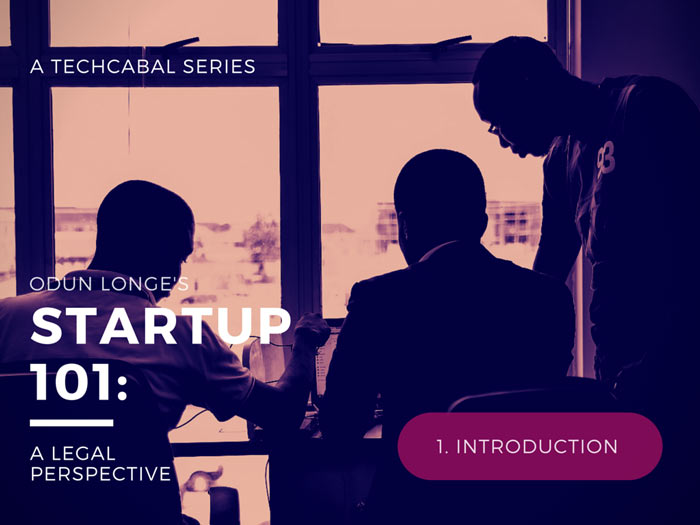I have been mandated/coerced/persuaded/psyched/engaged/instructed (call it what you will) by the good people of TechCabal to do a legal series on the needs of the Nigerian startup/entrepreneur and this article kick-starts our journey into Startup 101 – A Legal Perspective.
I am hoping this journey into the basic legal needs of every startup will not only inform and enlighten but would also be practicable and adaptable in your startup journey.
I promise to try to speak only English as we set out on this journey and keep the legal jargon to the barest minimum. After all, the startup grind is difficult as it is without having to make it worse with legalese prose.
So a brief teaser on what to expect in this series:
- Setting Up Basics: I have met a few people who think the only legal entity that exists in Nigeria is a “company”, and I know some reading this article are also of the same perception. Actually, that is not the case. I am pleased to announce to you that in Nigeria there are various options available to persons who seeks to set up businesses. Such entities include the Sole Proprietorship, Partnership, Limited Partnership, Limited Liability Partnership, the Private Limited Company, Public Limited Company etc., with each structure relevant to various business needs. Whilst not all these entities are suitable for a startup or an entrepreneur, we would touch on the various structures relevant to an entrepreneur.
- Setting Up Basics II: A single article would likely not do justice to the issue of setting up a business. So in Part II of Setting up Basics, we will touch on the pros and cons of each entity we considered in Part I. Basically, why you should opt for one structure over the other, which of course would depend on your peculiar needs and the stage you are in your startup/entrepreneurship grind.
- Founders Relationship: Having touched on the boring but extremely essential stuff, it gets a little more interesting as we proceed in the series. Here we will discuss the legal structure that needs to be in place among founders when they come together to do business. Is a handshake enough? Would a paper napkin acknowledgement of roles suffice? What are the essential terms that need to be in place among founders. If you like your glass half-full, the question would be “how do we keep the marriage peaceful and mitigate the likelihood of a divorce?”; and if you like your glass half empty, the question would be “how do we make plans to make the divorce as painless as possible “in case” it arises?”
- Vesting: What exactly is vesting? How does it work? What is a cliff period? Why vest? Well if you stay the course with us, these questions and more as they relate to vesting would be addressed.
- Intellectual Property: How can I protect my ideas? What are the patent laws in Nigeria? Are designs protected in Nigeria? Is copyright relevant to startups and entrepreneurs or just people in the arts? Why and when do I need to trademark? What is a service mark? This would be a guest post by my co-founder at The Longe Practice LP, Funkola, who is the lead on our intellectual property practice, who better to to write on this topic than she who deals with it on a regular basis.
- A Few Useful Documents to Note: Certain documents are sine qua non essential to the startup grind. I would list some of these documents explaining their usefulness and why you need to have them in place.
- Startup 101 from an Investor’s Perspective: This topic which would likely be the final in this series would be another guest post by a friend, Subomi Oraka, who serves as senior in-house counsel of a private equity fund and sits on our Advisory Board at The Longe Practice LP. She will be writing on the legal issues an investor (particularly an institutional investor) usually looks out for in a startup/entrepreneur it is considering investing in.
I hope you stay with me till we conclude this series. More exciting would be if you engage me in the comment section on issues you need clarification on, experiences you want to share or even information that would shed more light on the topics discussed. And if there is something you would like us to write on someday that has not been addressed in this series, feel free to drop a line
I’m looking forward to engaging with you, TechCabal readers and I hope you are as excited about this series as I am. So strap your belts, get comfortable as we embark on this legal journey.
Until the next episode when we delve into Setting Up Basics I, keep your eyes on the goal and keep grinding!
Legally yours,
Odun
Articles do no not constitute legal advice, neither has a lawyer-client relationship been created by engagement in the comment section. If you require professional legal advice, kindly contact your legal adviser.















